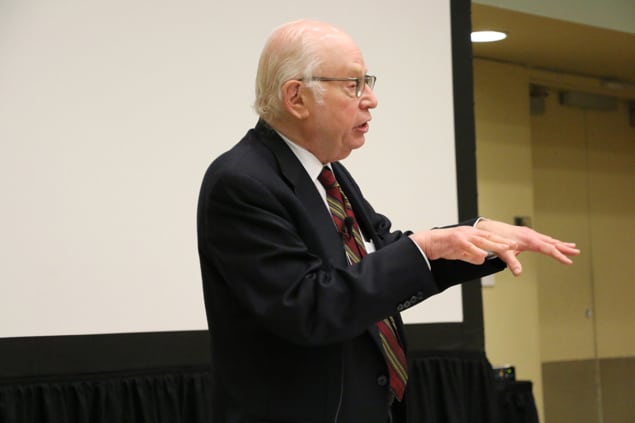
By Matin Durrani in Baltimore, Maryland, US
I wasn’t planning on blogging about the talk that the Nobel-prize-winning physicist Steven Weinberg gave yesterday afternoon here at the APS March meeting. He’d been speaking about his recent book To Explain the World: the Discovery of Modern Science, which examines the history of physics from the ancient Greeks to the present day.
The book ruffled a fair few feathers when it was published last year, with historians and philosophers annoyed at Weinberg’s approach to history, which basically involves judging the past from the standpoint of the present. It’s known as the “Whig interpretation” of history and sees past events as a march towards enlightenment, ignoring dead-ends and blind alleys. It’s the history of winners, if you like.
I have probably mis-stated the criticisms of Weinberg book – I’m no historian – and that’s my point. I felt the arguments against his approach were too subtle and nuanced to fit in a blog. But I changed my mind this morning about covering the session Weinberg appeared in. Not only because the room where Weinberg gave his talk was full to bursting, with about 500 people present, but also because some of the things he said, which I Tweeted yesterday, were proving popular on Twitter. Clearly, people want to hear what Weinberg says – he’s a master of the soundbite – so here, for posterity, are a few of his thoughts.
Weinberg on whether he knew his book would prove controversial: “I knew from the start I was being naughty.”
Weinberg on his basic approach to the history of science: “We should avoid imagining the past is like the present.”
Weinberg on why the Whig interpretation is worthwhile: “If we don’t use the things we have learned, the story we tell has no point.”
Weinberg on what we should investigate as researchers: “The point of science is not to solve the science that happens to be fashionable in the day. It’s to find out about the world.”
Weinberg on whether aesthetics or ethics has a role in deciding which theories in physics one should pursue: “I don’t think ethics plays much of a role in physical science.”
Weinberg on the importance of absorbing new scientific knowledge even if it conflicts with what you believed before: “Finding out you are wrong is a refreshing experience that everyone should have.”
Aged 82, Weinberg has lost none of his showmanship or intellect, with the above being just a sprinkling of his many penetrating insights. He was invited to respond to each of the other speakers at the session in turn – historians David Wootton, Jamil Ragep and William Thomas, and science writer Jennifer Ouellette – and had pithy retorts and remarks to them all.
“I enjoyed very much the first half of your talk,” he told Wootton, for example – the unspoken implication being that the second half was complete rot (even if he didn’t say so).
Ouellette raised the fascinating question of what a Whig historian in 500 years’ time would make of science today? They might, she pointed out, follow the full story of how dark energy was discovered, but wouldn’t understand other questions like why certain projects, rather than others, were funded or supported.
What was clear from yesterday’s session is that Weinberg – one of the giant minds of physics – still, it seems, retains his curiosity, appetite and love of of the subject. And it was great to see him in full flow, even for those who disagree with him.



